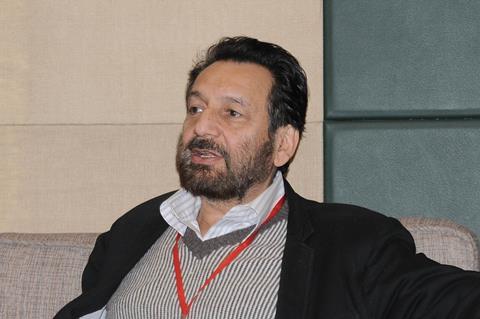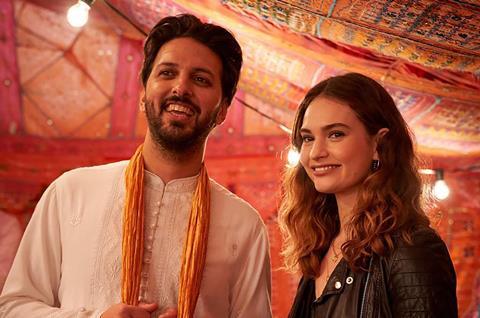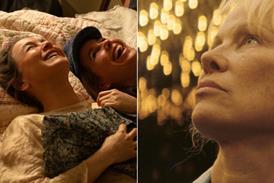Filmmaker serves as new festival director for 55th edition of festival, which opens tonight with Michael Gracey’s Better Man as part of Australia focus.

Filmmaker Shekhar Kapur believes he would be nowhere without the Indian film industry and its audiences. So, when the long-running International Film Festival of India (IFFI) asked him to come on board as festival director, his response was, “How could I not help?”
Running November 20-28 in the coastal area of Goa, the 55th edition of the festival opens with Michael Gracey’s Robbie Williams biopic Better Man and features a 15-strong competition line-up vying for the Golden Peacock award (and its lucrative $47,000 prize).
Kapur – whose credits include the 1999 Oscar-nominated period drama Elizabeth and, more recently, 2022’s What’s Love Got To Do With It? – chaired the festival’s international jury last year.

“I loved encouraging positive arguments,” he recalls of the experience. “Every jury member brings their own self to the films and some people hate [a film] while others love it. It’s fascinating.”
This year’s jury is again in safe hands, led by chairman, Indian filmmaker Ashutosh Gowariker, and also including Singaporean director Anthony Chen, UK producer Elizabeth Karlsen, Spain-born producer Fran Borgia, and Australian editor Jill Bilcock.
A diverse and inclusive selection
Having only been brought on within the last several months, Kapur says he has worked in more of an “advisory capacity” as festival director and member of the steering committee, entrusting most of the programming to the strand directors and experienced curators. (He’s also been busy in pre-production on his next feature – a UK-Indian co-production surrounding ideas of society’s obsession with putting value on everything.)
He is proud the team has curated a diverse selection of films in competition, including the world premieres of Iranian drama Fear & Trembling from Manijeh Hekmat and Faeze Azizkhani, and Nikhil Mahajan’s Indian crime thriller Raavsaheb.
Nine of the 15 features come from female filmmakers, an impressive feat in a year where other big festivals like Cannes and Venice barely managed 30% gender parity.
“We’ve come to a point where women have found their voice in filmmakers,” says Kapur on India’s female filmmakers finding global success with 2024 films like All We Imagine As Light (which will screen at IFFI) and Santosh. “I don’t think we need to push them anymore,” he continues. “They’re doing extremely well on their own.”
Kapur is also excited for festival opener Better Man, calling it “a very strange but fascinating film”. It was chosen as part of IFFI’s focus on Australia which also includes several other films in the programme as well as the Satyajit Ray lifetime achievement award for Rabbit-Proof Fence and Salt director Phillip Noyce.
“The idea of a country of focus is always to encourage Indian filmmakers to try and see if they can tell international stories,” he explains. “And see if they can do co-productions with Australia.”
In all, the festival will present more than 180 films from 81 countries, 15 of them world premieres. Festival sections in addition to the international competition also include galas (such as The Piano Lesson and Moana 2); the ICFT-UNESCO Gandhi Medal Nominees; international debut films competition; the Indian Panorama (opening with Swatantrya Veer Savarkar) including 25 features as well as 20 documentaries, shorts and experimental projects; Rising Stars for emerging filmmakers; and Mission Life (eco-conscious cinema).
In addition to the Australian focus, the British Film Institute has curated selections including In Camera and Layla for a UK spotlight. Centenary celebrations will honour Raj Kapoor, Tapan Sinha, Akkineni Nageswara Rao and Mohammed Rafi.
Embracing the next generation
With Indian debuts taking the international circuit by storm, it seems appropriate that this year’s IFFI theme is ‘Young Filmmakers – The Future Is Now’. Kapur himself encouraged the expansion of the 48-hour filmmaking challenge to include 100 young participants (up from 75) as well as the introduction of the festival’s new competition, a five-film selection of Indian debut features. More than 400 film students from across India are set to attend IFFI.
“With all the tools and technology available, filmmaking is becoming much more democratic,” Kapur says, referencing Artificial Intelligence (AI). It is a topic the filmmaker is passionate about, having also introduced a tech forum to IFFI 2024 in collaboration with leading AI company OpenAI and accessible to the general public.
“In India, the biggest issue for debut filmmakers is trying to get a star. It’s the only way to get a decent budget and to have hope for success,” Kapur explains. “[AI] will bring the cost of filmmaking down so much so that young up-and-coming filmmakers won’t need big stars anymore.”
These forward-thinking thoughts will also apply to IFFI 2025, when Kapur hopes he can expand the festival’s examination of technology and Eastern storytelling. “I’m setting the template for next year,” he says. “Filmmaking will not be the same anywhere in the world next year. Storytelling is going to change.”
For 2024 meanwhile, Kapur is focusing on “saying a big thank you” to Indian audiences who have supported him and the wider film industry. “This year is all about celebrating audiences,” he explains.
The general public will now have access to all of the festival masterclasses as well as to more screens (the festival now spreads its activities across more than 12 venues) to watch the festival’s films. Another innovation this year is IFFIESTA, a public-facing cultural event also including film as well as art and food that will run November 21-28 on the waterfront next to the Kala Academy.
Across festival activities, the festival has a new pledge on accessibility, working with access organisation Svayam helping to make its venues and screenings far more accessible than in the past.
For one of the biggest film industries in the world, Kapur says access to cinemas countrywide is still a challenge, but that IFFI is a welcome exception. “There are just not enough theatres in India to support the level of filmmaking,” he explains. “That’s why [IFFI] is important, people can come and see films for much less cost. It becomes like a celebration.”






















No comments yet